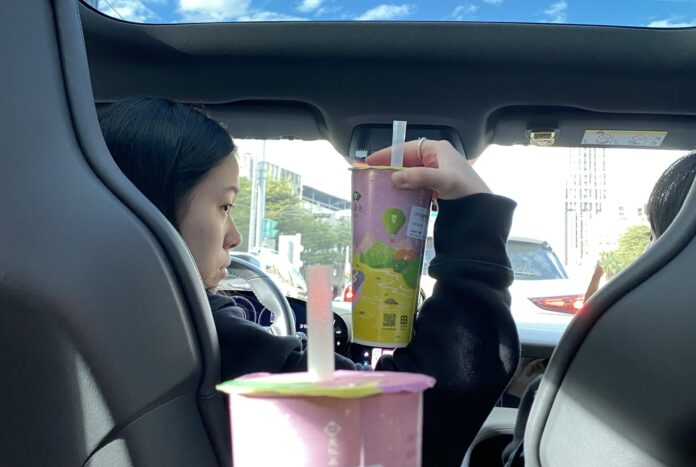In order to better understand how caffeine is consumed in daily life, I interviewed two organization members with completely different caffeine habits. The interview with Angelina Hsu, Paul Na, and myself is transcribed below.
Interview with Angelina Hsu(Team leader):
Q1: How often do you drink coffee?
A: Honestly, I don’t really drink coffee because I think it’s a bad habit. If I had to put a number on it, maybe once a month?
Q2: What are your main reasons for drinking coffee? In what situations do you usually drink it (e.g., to stay awake, socialize)?
A: I don’t drink coffee regularly. I only have it in extreme situations, like when we were driving to New Jersey for an away basketball game or on exam days when I’ve had a bad night’s sleep.
Q3: Have you tried any alternatives to coffee for boosting energy?
A: Since I don’t like coffee, I usually have a piece of candy or listen to music—just whatever I feel like.
Q4: Are you aware of your caffeine tolerance? Do you know how much caffeine you can handle before experiencing negative effects?
A: I’m not exactly sure of my caffeine tolerance, but I do know that one cup of coffee makes it hard for me to sleep. I already have trouble sleeping, so coffee just makes it worse.
Q5: How much do you know about common foods and beverages that contain caffeine?
A: I think there are a lot, such as milk tea, regular tea, chocolate, chocolate milk. I do consider how much caffeine is in there before I consume, but it is very hard to know for sure, so I usually just guess.
Q6: Have you ever consumed too much caffeine? If so, what negative effects did you experience?
A: I barely drink coffee or consume caffeine, so I’d say no, not really.
Q7: If a device existed to monitor and control your caffeine intake, would you use it? What concerns, if any, would you have about using such a device?
A: Personally, I wouldn’t use such a device because I don’t think I need to consume caffeine. But I can see how people who rely on caffeine daily might find it very useful.
Interview with Paul Na(Team coach):
Q1: How often do you drink coffee?
P: I used to drink it every single day, but I’ve been trying to stay away from it recently.
Q2: What are your main reasons for drinking coffee? In what situations do you usually drink it (e.g., to stay awake, socialize)?
P: Sometimes I take it as my daily routine, sometimes for no real reason, sometimes try to stay awake. You know, just some important stuff that need to focus on, like tasks where I really need to have a clear mind and not fall asleep.
Q3: Have you tried any alternatives to coffee for boosting energy?
P: No, I haven’t tried any alternatives. Lately, I’ve been tried to adjust my daily routine to make sure I am not too tried.
Q4: Are you aware of your caffeine tolerance? Do you know how much caffeine you can handle before experiencing negative effects?
P: I don’t know my caffeine tolerance.
Q5: How much do you know about common foods and beverages that contain caffeine?
P: I’d say coffee, energy drinks, coke, and tea are the ones I’m aware of.
Q6: Have you ever consumed too much caffeine? If so, what negative effects did you experience?
P: Yes, I have. There was one time I think I had palpitations, where my heart rate speed up, I felt extremely nervous, had cold sweats, and found it really hard to calm down and could not communicate properly with others. But I think it also had to do with my mental stage during that period of time, I wasn’t in a stable mental stage, so it all added up.
Q7: If a device existed to monitor and control your caffeine intake, would you use it? What concerns, if any, would you have about using such a device?
P: Yes, for sure. I don’t really have any concerns. My main focus would be on the positive effects, like how it helps me track how much caffeine I have taken in a day.
Relevance:
I think this was a very interesting interview. I interviewed Angelina Hsu first, and knowing that she doesn’t drink coffee much actually made me a bit nervous at the beginning. I was worried if I would be able to learn anything from the interview with her. After finishing her interview, I interviewed Paul, who used to drink a lot of coffee. By comparing the answers I got from both of them, I actually learned a lot.
From the interviews with Angelina Hsu and Paul Na, I gained valuable insights into different caffeine consumption habits and attitudes. Angelina represents users who only consume caffeine when it’s absolutely necessary for them, like during exams or long drives, while Paul reflects users who used to heavily rely on caffeine in their daily life but are trying to cut back. Both of them highlight a lack of awareness of their own caffeine tolerance, with Paul sharing his experience of negative effects from overconsumption. They both have a positive attitude toward using a device that tracks and manages caffeine intake, especially Paul, who mentioned his interest in monitoring his consumption. I think these insights suggest the need for people to know their tolerance levels, with a potential market for devices that help people reduce their intake or avoid negative side effects from caffeine.
Reference/Sources:
Special thanks to Angelina Hsu and Paul Na from the Chinese Women’s Basketball Club, who took the time to contribute to my interview.




